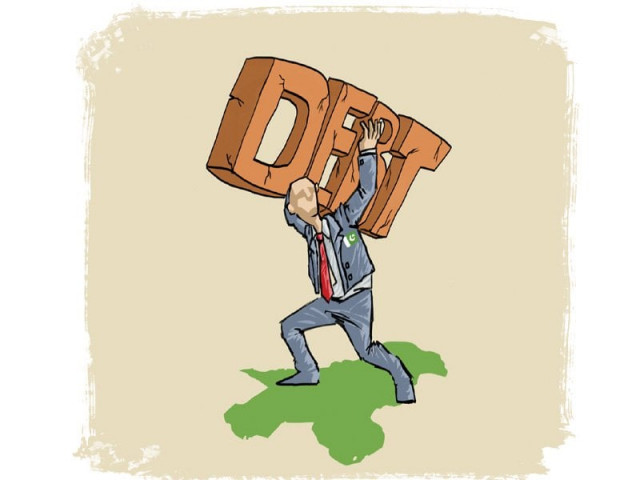Federal govt's debt jumps to Rs33 trillion by July-end
Centre adds Rs1.23 trillion to debt level in just one month

Centre adds Rs1.23 trillion to debt level in just one month. ILLUSTRATION: JAMAL KHURSHID
The debt bulletin that the State Bank of Pakistan (SBP) released late on Friday night showed that the central government's debt stood at Rs33.02 trillion at the end of July. There was an addition of Rs1.23 trillion or 3.9% as compared to the June's level of Rs31.8 trillion.
The central government debt comprises long and short-term domestic debt and external debt. The exchange rate remained unchanged in June and July at Rs163.05 to a dollar, saving the government from a self-inflected exchange rate loss.
The debt accumulation should be direct result of the gap between expenditures and revenues but the numbers released by the central bank do not match with the estimated budget deficit in July.
Initial estimates of the Ministry of Finance suggest that the budget deficit in July was around Rs270 billion or 0.6% of gross domestic product (GDP). Ideally, the increase in debt should not have been more than that level.
The SBP report showed that almost the entire increase in the federal government's debt was on account of short-term debt, which swelled from Rs5.5 trillion to Rs6.8 trillion. There was an increase of Rs1.28 trillion or 23.3% in the short-term debt in July alone.
The federal government's debt acquired through the sale of Market Treasury Bills (MTBs) to commercial banks increased from Rs4.92 trillion to Rs6.2 trillion - an addition of Rs1.28 trillion or 26%.
The share of short-term domestic debt in the total domestic debt rose from 26.5% in June to 30.8% in July.
Overall, the central government's total domestic debt increased from Rs20.7 trillion to Rs22 trillion in July - a net addition of Rs1.28 trillion on the back of short-term debt hike. The long-term domestic debt remained unchanged at Rs15.2 trillion in July.
In rupee terms, the external public debt decreased Rs44 billion or 0.4% to Rs11 trillion in July.
In June, the federal government had restructured its short-term domestic debt by quietly issuing long-term Pakistan Investment Bonds (PIBs) to the central bank, which increased the share of long-term debt to 74% of the total domestic debt.
The re-profiling of short-term treasury bills into long-term PIBs in June cost the federal government nearly Rs300 billion on account of accrued interest on Rs7.7 trillion worth of short-term debt.
Owing to a ban imposed by the International Monetary Fund (IMF) on borrowing from the central bank, the federal government's debt acquired from the State Bank remained unchanged at Rs571 billion in July.
It seemed that the government was continuing with its policy of building cash buffers ahead of a major repayment of maturing debt, which added nearly Rs1 trillion to the public debt. Nearly Rs3.2 trillion worth of treasury bills were maturing in August.
However, the policy of building cash buffers comes with a cost as the government pays interest on the idle money lying in its accounts.
The central government's total debt had surged to Rs31.8 trillion with the net addition of Rs7.6 trillion from July through June of the last fiscal year, reported the SBP.
In the previous fiscal year, the central government's debt increased at a pace of 31.3% due to the shortfall in tax collection, uncontrolled expenditures on debt servicing and defence, depreciation of the currency and almost no profit declared by the central bank.
Out of the Rs7.6-trillion debt added in the last fiscal year, Rs1.257 trillion was on account of cash buffers.
Currently, the federal government relies heavily on commercial banks to service its maturing debt. Banks are also exploiting the interest rate corridor of the SBP by parking their idle money and earning profits equal to the discount rate.
The central bank has also come under increasing pressure to cut its policy rate, which is currently 5% higher than the core inflation rate of 8.2%. The SBP is set to announce the monetary policy on Monday amid expectations of a 25-basis-point or 50-basis-point cut in the rate.
Any decision to keep the interest rate unchanged would not address concerns of the businessmen who are reluctant to book heavy working capital cost in their books.



















COMMENTS
Comments are moderated and generally will be posted if they are on-topic and not abusive.
For more information, please see our Comments FAQ